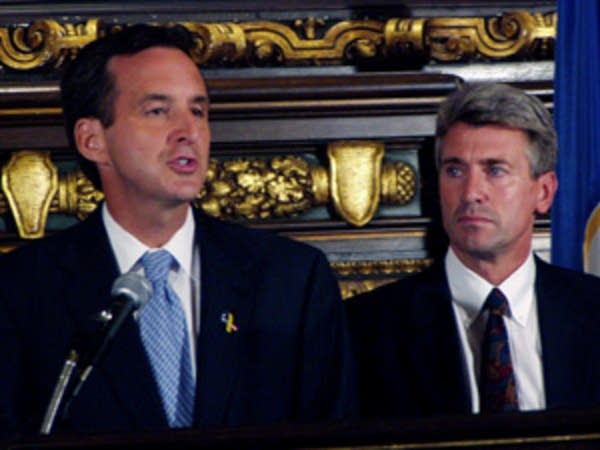Pawlenty's political future may be at stake after bridge calamity

Since last week's 35W bridge collapse in Minneapolis, Gov. Pawlenty has frequently been in front of microphones and cameras offering a calm and measured response to the tragedy.

"We have witnessed a day of horror and grief and tragedy and loss and pain and burden," he said in his earliest statements after the collapse. "And again, we want to express our prayers and our thoughts to the families who experienced a loss of a loved one or a serious injury or other trauma. Please know that America and Minnesota's thoughts and prayers are with you and they will continue to be throughout."
Dan Hofrenning, a political science professor at St. Olaf College in Northfield, has been keeping an eye on Minnesota's governor in the week since the bridge collapse. Under the circumstances, Hofrenning says Pawlenty has responded appropriately and effectively.
"Crises afford incumbents the opportunity to get a lot of air time and to reassure the public that this community will address the problem in a forthright way," says Hofrenning, who believes the Republican governor could benefit politically by showing he can adjust to changing times in the wake of the bridge catastrophe.
Create a More Connected Minnesota
MPR News is your trusted resource for the news you need. With your support, MPR News brings accessible, courageous journalism and authentic conversation to everyone - free of paywalls and barriers. Your gift makes a difference.
The biggest adjustment was his reversal on the state gas tax. After vetoing a gas tax increase twice before, Pawlenty now says he's open to the idea.
"Nobody likes the gas tax," Pawlenty said. "I don't particularly like it myself. But we have a divided government, somebody has to extend the olive branch and try to bring the sides together so we can make some progress."
One analyst says the scrutiny of Gov. Pawlenty is just beginning. The ongoing bridge investigation will raise many questions about the Pawlenty administration and state transportation policy.
Pawlenty has also been seen standing shoulder-to-shoulder this week with a longtime political adversary, Minneapolis Mayor R.T. Rybak. Pawlenty and Rybak have often sparred publicly over state and city funding issues. Rybak, a Democrat, describes the new relationship as a practical arrangement.
"The governor and I have really made it clear to each another that we're going to do everything we can to make this work," Rybak said. "We're going to do our jobs. We're going to disagree in places. But we're going to do our best to show, I think, to the state and whole country that in a time of crisis the mayor and governor can get things done."
Another political analyst says the scrutiny of Gov. Pawlenty is just beginning. Norman Ornstein, a resident scholar at the American Enterprise Institute, says the ongoing bridge investigation will raise many questions about the Pawlenty administration and state transportation policy.
"What happened to transportation bills? What was the governor's role in allocating resources for transportation? What's happened to the inspection process? How much of an emphasis was placed on doing repair work of rebuilding work of this infrastructure?" Ornstein said.
Ornstein says the 35W collapse has highlighted a nationwide problem with aging roads and bridges, and will influence the debate on government spending.
Pawlenty has gained a lot of national attention, and been mentioned as a possible vice presidential running mate, by championing tax cuts and less government. But Ornstein says that approach to governing could now cause problems for Pawlenty.
"Gov. Pawlenty has vetoed some transportation bills, talked about restraining government. And if it turns out that that restraint, so that we could keep from having more taxes, came at the expense of infrastructure repair, he's going to have some explaining to do," Ornstein said.
Ornstein also says the gas tax flip-flip could hurt Pawlenty. He says the level of damage will depend on whether Pawlenty's political opponents make the governor look like a hypocrite, or paint him as someone trying to reverse a bad policy decision. Ornstein also says Pawlenty has now lost the signature message of his governorship.
